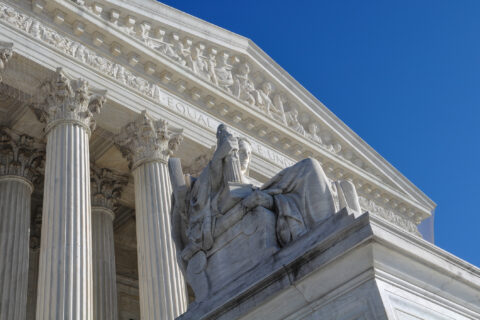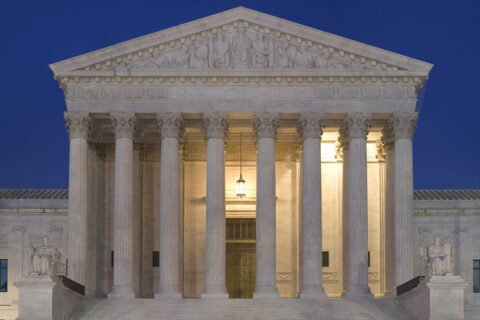The 2024-25 United States Supreme Court Term officially kicked off on Monday, October 7. Several significant cases that could impact local governments and their interests are before the court this term. The National League of Cities (NLC), through partnership with the Local Government Legal Center (LGLC), has joined several amicus briefs supporting and advocating local government positions on key legal issues of relevance.
Cases of importance this term include questions of employment law issues related to Title VII and the Fair Labor Standards Act, environmental law and the permitting requirements under the Clean Water Act, the scope of authority for a federal regulation relating to “ghost guns,” when attorney’s fees can be assigned and The Americans with Disabilities Act. As the Supreme Court accepts additional cases to their current term docket, NLC will keep local leaders informed on important cases that impact local governments.
Ames v. Ohio Department of Youth Services
This case is related to an important employment law question under Title VII. Title VII of the Civil Rights Act of 1964 prohibits discrimination in employment based on race, color, religion, sex or national origin. The specific issue is whether a plaintiff that belongs to the majority group of a class must show “background circumstances” supporting the suspicion that the defendant is an “unusual employer who discriminates against the majority.” This would be an additional element that the plaintiff must prove in addition to pleading the other elements of a Title VII discrimination claim.
This “background circumstances” test is one that the lower court found was required, given that the plaintiff was a member of the majority group in this case. The court explained that a plaintiff can meet this additional showing with evidence that a member(s) of the relevant minority group of the class made the employment decision at issue or by showing a pattern of discrimination by the employer against members of the given majority group.
As local governments collectively continue to be one of the largest employers in the country, this is an important case that could impact the expansion of local government liability. Lawsuits under Title VII are expensive to defend and resource intensive for local governments. A ruling that applies the background circumstances test would make it harder for employees in majority groups passed over for promotions or subject to adverse employment decisions to bring Title VII lawsuits.
EMD Sales v. Carrera
This is another employment law case related to the power burden of proof level that employers must satisfy to demonstrate the applicability of a Federal Labor Standards Act (FLSA) exemption to overtime pay. Generally, under FLSA, employers must pay employees overtime pay at a rate and a half for all work done above 40 hours a week. However, there are a number of exemptions from the FLSA’s minimum wage and overtime requirements. The exemption relevant to this case is the “outside sales” exemption, which exempts employers from paying overtime for work done outside the office.
At issue in this case is the level of the burden of proof that must be demonstrated to show that the exemption applies. The parties disagree on whether the burden should be a “preponderance of the evidence” (the evidence shows more likely than not) or “clear and convincing evidence” (a significantly higher threshold).
This case directly impacts the burden of proof that local governments will need to show as an employer to demonstrate an exemption to overtime under FLSA. Claims under the FLSA are extremely common, and the burden of proof applies to each of the numerous exemptions. If the court finds that the higher standard of burden of proof applies, it will create significant financial implications for cities. Given the severe penalties for violating the rules under FLSA, there are significant potential liability issues at stake in this case for local governments.
City and County of San Francisco v. EPA
The issue in this case is whether the U.S. Environmental Protection Agency (EPA) can impose generic prohibitions in their National Pollutant Discharge Elimination System (NPDES) permits without identifying specific limits to which pollutant discharges must conform.
Under the Clean Water Act (CWA), the EPA has the authority to issue National Pollutant Discharge Elimination System (NPDES) permits that contain pollutant levels to provide manageable and precise benchmarks for enforcement. Contrary to the requirements of the CWA and EPA guidance, the permits EPA regularly issue impose generic prohibitions against pollutant discharging in a manner that contributes to exceeding applicable water quality standards. The generic prohibitions that are used in the NPDES permits issued to localities around the country create uncertainty and increase the risk that local governments will be subjected to significant penalties. The generic water quality terms in the permits expose permitholders nationwide to enforcement actions while failing to tell them how much they need to limit or treat their discharges to comply with the CWA. A decision in this case would provide clarity to local governments on CWA requirements.
Garland v. VanderStok
The issue in this case is whether a weapon parts kit that has been designed to or may readily be converted to expel a projectile by the action of an explosive is considered a “firearm” regulated under the Gun Control Act of 1968 (GCA). The GCA is the federal law that imposes licensing, background checks, recordkeeping and serialization requirements on persons engaged in the business of importing, manufacturing or dealing in firearms. In 2022, the Bureau of Alcohol, Tobacco, Firearms and Explosives (ATF) issued a regulation that clarified the definition of “firearm” under the GCA includes products and kits that can “readily be converted” into an operational firearm or a functional frame or receiver. These types of products are commonly referred to as “ghost guns.”
Ghost guns create significant public safety concerns for local law enforcement as they allow minors and felons who are otherwise prohibited from owning guns under the GCA to obtain them without any background checks or serialization requirements. This lack of serial numbers has created significant roadblocks for law enforcement in investigating violent crimes, as they cannot typically be traced. The Court will determine whether these “ghost gun” products are subjected to the requirements of the GCA or if these types of products do not meet the definition of a “firearm.”
Lackey v. Stinnie
The issue in this case involves the important question of deciding when attorney’s fees apply for plaintiffs in civil rights cases. Section 1988 of the U.S. Code provides that a prevailing party may collect attorney’s fees in certain civil suits (including Section 1983 actions). The Court will determine in this case what “prevailing” really means. The specific question is whether a plaintiff who obtains a preliminary injunction can obtain attorney’s fees under Section 1988 if there is never a permanent injunction or full ruling on the claim’s merits since the defendant voluntarily changed their conduct.
As local governments are party to civil suits (including under Section 1983 actions), a limitation in the award of attorney’s fees would result in a significant financial victory for local governments involved in these types of cases. Attorney’s fees can be as high or higher than the underlying liability or damages of a civil suit, and they regularly cost governments hundreds of thousands or millions of dollars. If the Court rules that attorney’s fees are appropriately awarded only when there is a conclusive ruling, this would significantly reduce future potential civil litigation costs for local governments.
Stanley v. City of Stanford
This case presents a question of whether a former employee can sue their employer under The Americans with Disabilities Act (ADA) for discrimination in post-employment distribution of fringe benefits if they no longer hold their job. Title I of the ADA prevents discrimination against individuals with disabilities regarding compensation and other terms of employment. Lower courts found that a former employee doesn’t qualify as an “individual with a disability” and therefore cannot bring suit for discrimination in post-employment distribution of fringe benefits.
Local governments are sometimes faced with difficult decisions when balancing the public fisc with other local government operations or initiatives. As local leaders continue to look for cost-saving mechanisms to balance their budgets, some may look to post-employment benefit liabilities as a place to potentially cut costs and fulfill their duties of fiscal responsibility. This case is important to ensure local governments have the flexibility and authority they need to make these difficult decisions without the threat of litigation.
From the Event: Supreme Court Preview for Local Governments 2024-25 Term
Recently, the LGLC and its founding members, NLC, the National Association of Counties (NACO) and the International Municipal Lawyers Association (IMLA) hosted a webinar featuring legal experts previewing some of the local government issues and cases to be heard before the Court this term.









